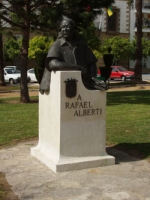阅读lā fǎ 'āi 'ěr · ā 'ěr wéi dì Rafael Alberti在诗海的作品!!! | |||
After falling in with the other members of the Generation of '27, Alberti began to show the profound influence of Luis de Góngora on his work, most obviously in Cal y canto ('Quicklime and Plainsong', 1929). It was, however, the introspective surrealism of Sobre los ángeles ('Concerning the Angels', 1929), whose tone was perhaps anticipated by some of the more sombre moments of Cal y canto, that established Alberti as a mature poet. Sobre los ángeles is widely considered to be Alberti's best work.
During the 1930s Alberti's work became overtly political, beginning with Con los zapatos puestos tengo que morir ('I Have to Die Wearing my Own Shoes', 1930). The establishment of the Second Spanish Republic in 1931 pushed Alberti towards Marxism and he joined the Communist Party of Spain. His poetry from this militant period is collected in Consignas ('Orders', 1933), Un fantasma recorre Europa ('A Ghost Stalks Europe', 1933), 13 bandas y 48 estrellas ('13 Stripes and 48 Stars', 1936) and El poeta en la calle ('Poet in the Street', 1938).
A Loyalist in the Spanish Civil War, Alberti fled to Argentina following the victory of Franco in 1939. Here he worked for the Losada publishing house and continued writing and painting. His work in exile is full of nostalgia for Spain, notably the poetry collection Entre el clavel y la espada ('Between Carnation and Sword', 1941). He also published collections inspired by various themes, including painting (A la pintura ('On Painting', 1945))--Alberti had briefly been a painter before turning to writing--and the sea (Pleamar ('High Tide', 1944), Oda marítima ('Maritime Ode', 1953)). His autobiography, La arboleda perdida ('The Lost Grove') was published in 1942.
After living in various European cities, including Paris and Rome, he returned to Spain in 1977. Shortly after his return Alberti was elected deputy for Cadiz in the First Legislature on the Communist Party Ticket.
Alberti's plays include El hombre deshabitado ('The Empty Man', 1930), Fermín Galán (1931), De un momento a otro ('From One Moment to Another', 1938-39), El trébol florido ('Clover', 1940), El adefesio ('The Disaster', 1944) and Noche de guerra en el Museo del Prado ('A Night of War in the Prado Museum', 1956), as well as adaptions and other short pieces.
Alberti was awarded the Premio Cervantes, the Spanish literary world's highest honour, in 1983. He was also awarded Lenin Peace Prize for the year 1965. He died at the age of 96 from a lung ailment.
